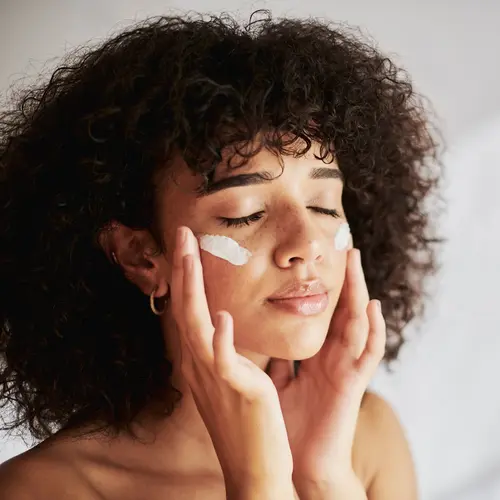Alpha, beta, hydroxy acids, vitamins, and derivatives -- the words on skin care products can be confusing.
This simple guide will help you understand the ingredients that may benefit your skin. Then, if you're still unsure which skin care products are right for you, ask your dermatologist or consult with a skin aesthetician at your local medical spa or beauty counter.
Alpha-Hydroxy Acids (AHAs)
Alpha-hydroxy acids include glycolic, lactic, tartaric, malic, and citric acids. They have become increasingly popular over the last 20 years. In the U.S. alone, there are over 200 makers of skin care products containing alpha-hydroxy acids.
Creams and lotions with alpha-hydroxy acids may help with fine lines, irregular pigmentation, and age spots. Side effects of alpha-hydroxy acids include mild irritation and sun sensitivity. For that reason, sunscreen should be used every morning.
To help avoid skin irritation with alpha-hydroxy acids, it's best to start with a product with low concentrations of AHA. Also, give your skin a chance to get used to the product. Start out by applying AHA skin products every other day, gradually working up to a daily application. Don't use too much; follow the instructions on the package.
Beta-Hydroxy Acid (Salicylic Acid)
Salicylic acid exfoliates skin, unclogs pores and can improve its texture and color. It also helps with acne.
Many skin care products contain salicylic acid. Some are available over-the-counter and others require a doctor's prescription. Studies have shown that salicylic acid is less irritating than skin care products containing alpha-hydroxy acids but has similar results in improving skin texture and color.
Warning: People who are allergic to salicylates (found in aspirin) should not use products containing salicylic acid. Salicylic acid can be absorbed into the bloodstream and may cause an allergic reaction or contact dermatitis. Pregnant or nursing women should not use products containing salicylic acid.
Hydroquinone
Skin care products containing hydroquinone are often called bleaching creams or lightening agents. These skin care products are used to lighten hyperpigmentation, such as age spots and dark spots related to pregnancy or hormone therapy (also called melasma).
Some over-the-counter skin care products contain hydroquinone. Your doctor can also prescribe a product with a higher concentration of hydroquinone if your skin doesn't respond to over-the-counter treatments.
If you are allergic to hydroquinones, you can use products containing kojic acid or niacinamide (vitamin B3) instead. Pregnant women cannot use hydroquinone.
Kojic Acid
Kojic acid is a more recent remedy for treating pigment problems and age spots. First developed in 1989, kojic acid has a similar effect as hydroquinone. Kojic acid is made from a fungus, and studies have shown that it is effective at lightening skin.
Retinol
Retinol is made from vitamin A, and it's in many non-prescription skin care products. Retinol's stronger counterpart is tretinoin, which is the active ingredient in Retin-A and Renova, available by prescription only.
If your skin is too sensitive to use Retin-A, retinol is an alternative, although the effects are less impressive. Retinol may improve mottled pigmentation, fine lines and wrinkles, skin texture, and skin tone and color.
You may also hear about retinyl palmitate. This is in the same family as retinol, but if the skin care product you choose contains retinyl palmitate, you will need to use more of this product than one that contains retinol to get the same effect. Pregnant women or nursing mothers cannot use retinol.
Trifarotene (Aklief) is another retinoid used to treat acne.
Vitamin C
Vitamin C helps to minimize fine lines, scars, and wrinkles. It's the only antioxidant that is proven to boost production of collagen, which is a key part of skin's structure.
If you are considering using a topical vitamin C preparation, ask your dermatologist which product will be the most effective for you.
Hyaluronic Acid
Skin care products containing hyaluronic acid are often used with vitamin C products to assist in effective penetration.
Hyaluronic acid occurs naturally (and quite abundantly) in people and animals and is found in young skin, other tissues, and joint fluid.
Hyaluronic acid is part of the body's connective tissues, and is known to cushion and lubricate. Aging destroys hyaluronic acid. Diet and smoking can also affect your body's level of hyaluronic acid over time.
Skin care products with hyaluronic acid are most frequently used to treat wrinkled skin although they don't replace anything the body has naturally lost. These are very effective moisturizers.
Copper Peptide
Studies have shown that copper peptide promotes the production of collagen and elastin in your skin. It also acts as an antioxidant and promotes production of glycosaminoglycans (such as hyaluronic acid).
Studies have also shown that copper-dependent enzymes help firm, smooth, and soften the skin quicker than most other anti-aging skin care products. In addition, copper peptides have been shown to remove damaged collagen and elastin from the skin and scar tissue.
Be wary of these claims, however, since the effects on your skin may be far less than is seen in laboratory testing.
Alpha-Lipoic Acid
Alpha-lipoic acid diminishes fine lines, gives skin a healthy glow, and boosts levels of other antioxidants, such as vitamin C.
Alpha-lipoic acid can enter all parts of a skin cell. Due to this quality, it is believed that alpha-lipoic acid can provide more protection than other antioxidants against so-called free radicals that can damage skin.
DMAE (Dimethylaminoethanol)
The brain makes DMAE. DMAE in skin care products shows minimal effects at best when applied on skin for the reduction of fine lines and wrinkles.


